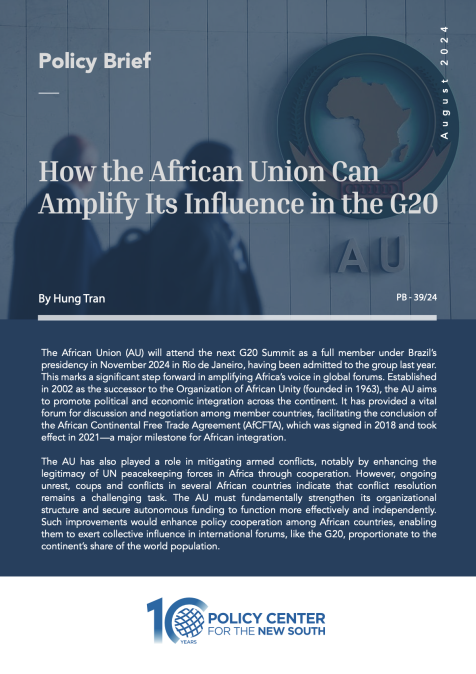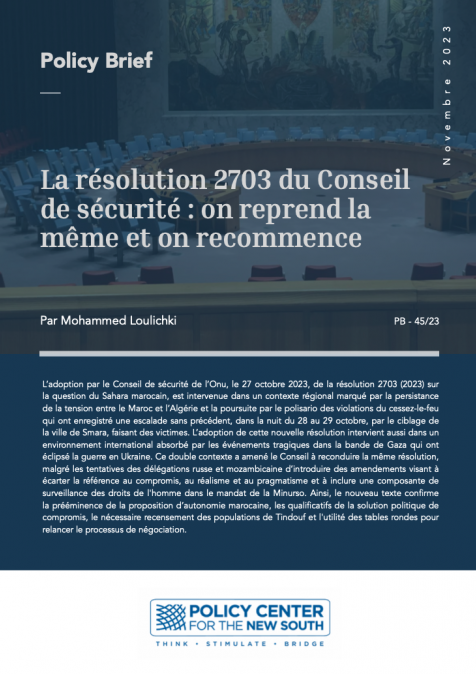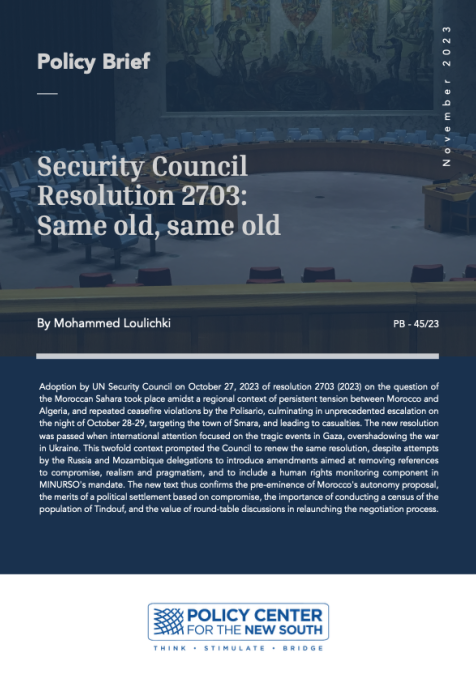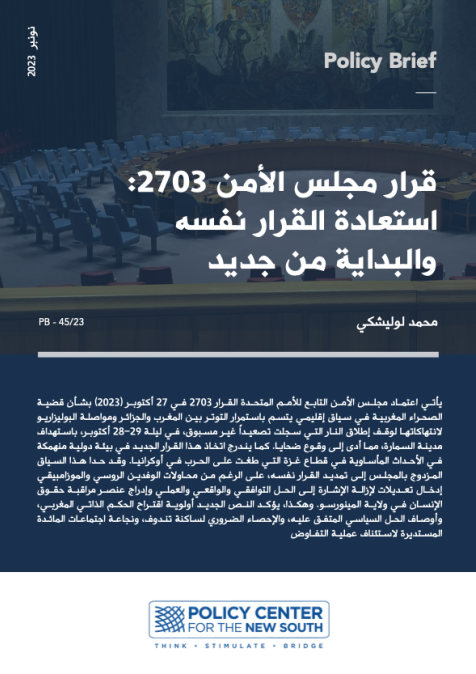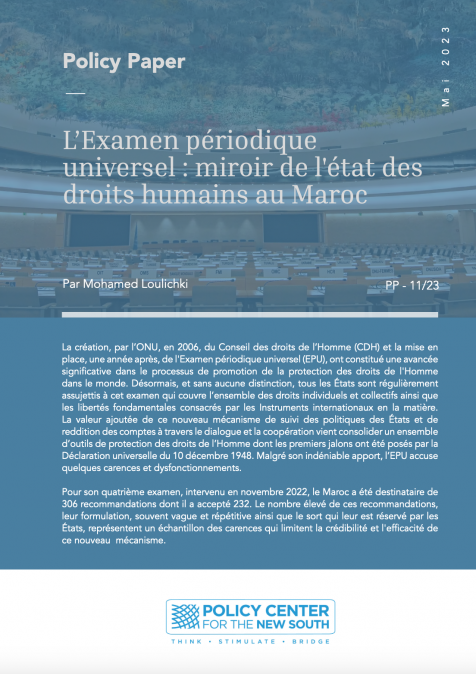Publications /
Policy Brief
The African Union (AU) will attend the next G20 Summit as a full member under Brazil’s presidency in November 2024 in Rio de Janeiro, having been admitted to the group last year. This marks a significant step forward in amplifying Africa’s voice in global forums. Established in 2002 as the successor to the Organization of African Unity (founded in 1963), the AU aims to promote political and economic integration across the continent. It has provided a vital forum for discussion and negotiation among member countries, facilitating the conclusion of the African Continental Free Trade Agreement (AfCFTA), which was signed in 2018 and took effect in 2021—a major milestone for African integration.
The AU has also played a role in mitigating armed conflicts, notably by enhancing the legitimacy of UN peacekeeping forces in Africa through cooperation. However, ongoing unrest, coups and conflicts in several African countries indicate that conflict resolution remains a challenging task. The AU must fundamentally strengthen its organizational structure and secure autonomous funding to function more effectively and independently. Such improvements would enhance policy cooperation among African countries, enabling them to exert collective influence in international forums, like the G20, proportionate to the continent’s share of the world population.
Strengthening Organizational Structure and Budget
The African Union is currently structured in an unwieldy manner, requiring direct involvement from all member states across various levels of governance. At the top of the hierarchy is the Assembly of Heads of State and Government, which meets once a year and serves as the supreme policy and decision-making organ. This is supported by an Assembly Bureau. Below the Assembly is the Executive Council, typically composed of foreign ministers from all member states. The Executive Council meets more frequently and reports to the Assembly. The daily work of the AU is conducted by the Permanent Representative Committee, which includes representatives from all member states and collaborates with the AU Commission to ensure coordination among members and Regional Economic Communities. Specialized Representative Committees, also comprising all members, work with the AU Commission’s departments on specific issues. Additionally, the Political and Social Security Council, which receives delegated authority from the Assembly, addresses specific security-related matters.
Below these organs is the AU Commission (AUC), composed of a Chairperson and Vice Chairperson elected by the Assembly, six Commissioners nominated by the Executive Council and appointed by the Assembly, and AUC staff. The AUC functions as the Secretariat of the AU, supporting its leadership and representing the organization under the guidance and mandate of the Assembly and the Executive Council. It performs day-to-day tasks, working closely with representatives of all members. It is important to distinguish the role of the AUC as the AU Secretariat from that of the European Commission (EC). Unlike the AUC, the EC acts as the politically independent executive arm of the European Union (EU), implementing policies approved by the European Parliament and the Council of the EU. The EC is solely responsible for proposing new European legislation. In addition, the Pan-African Parliament, established in 2004, currently holds limited “consultative and advisory” powers and has yet to pass a single law.
The organizational structure of the AU places significant authority in organs composed of representatives from all member states at various levels of seniority. This arrangement complicates the decision-making and execution processes, particularly concerning the AUC. It can lead to duplicative efforts, wasting scarce resources. Additionally, the frequent rotation of member officials representing member states can hinder their ability to specialize and accumulate experience. This stands in contrast to the AUC’s dedicated and professional staff, who provide continuity and expertise.
It has been argued that the AU has been weak because member states want it that way: they neither fully trust it nor take it seriously. For instance, in 2021-23, 93% of AU decisions have not been implemented by member states. In short, AU-mandated audit reports have concluded that the AU is dysfunctional and not fit for the purpose. This has to change if Africa wants to be taken seriously by the rest of the world.
Another major weakness of the AU is its dependence on external funding sources, primarily assistance from the EU, UN, US, China and others, which covers two-thirds of its annual budget of $654 million in 2023. Although the 27th AU Summit in Kigali in July 2016 approved a resolution calling on members to implement a 0.2% levy on eligible imported goods—designed to raise $1.2 billion annually—to fund its budget, only 17 out of 54 members have ratified that decision. More importantly, less than 40% of AU member states have actually contributed to its budget. As a result, “the AU is currently not financed in a predictable, sustainable, equitable or accountable manner,” according to the AU itself. This dependence on external funding sources poses the risk that the AU could be compromised in setting its priorities. Basically, if African countries want to advance their economic integration for development and to amplify their voices in international forums, they have to put money where their mouth is.
First and foremost, member states must fulfill their commitments to adequately fund AU operations. The goal set at the June 2015 AU Summit in Johannesburg, which called for members to cover 100% of the operational budget, 75% of the program budget, and 25% of the peacekeeping budget, should be achieved as soon as possible. The push for budgetary reform may gain momentum with Kenya’s President William Ruto, a vocal advocate for AU financial independence, succeeding Rwanda’s President Paul Kagame as the AU Champion for Institutional Reform. External assistance from development partners should be welcomed for capacity building, such as staff training and skill development, rather than out of financial necessity.
Second, the governance structure of the AU should be significantly streamlined, particularly by rationalizing the duplicative functions of organs that include all member states. This can be achieved if members overcome their lingering mistrust and empower the AU. Ideally, the AU Commission should be significantly upgraded as the executive arm of the AU, with autonomous authority in delegated areas, rather than functioning merely as its secretariat. To fulfill this role, the AUC must be adequately resourced and staffed with competent “civil servants”.
The status of the AUC chairperson should also be elevated to act as a principal representative of the AU at high-level international meetings, such as the G20 Summits—potentially alongside the Chairperson of the AU Assembly of Heads of State and Governments as co-equals. This arrangement would mirror the EU, where the Presidents of the European Council and the European Commission both attend top-level international meetings as co-equals, each with a five-year term mandate.
In comparison, the AU will be represented at the upcoming G20 Summit by the Chairperson of the Assembly, with assistance from the AUC Chairperson, as decided at the 37th AU Summit in Addis Ababa on February 18-19, 2024. However, the annually rotating Chairperson of the Assembly may lack the accumulated knowledge and continuity necessary to articulate Africa’s positions, qualities that a four-year term of the AUC Chairperson, with the possibility of reappointment, could provide. The AU could address these shortcomings when electing a new AUC Chairperson in 2025.
Substantively, the AUC should be entrusted with primary responsibility for managing Africa’s economic integration efforts, particularly in driving the implementation of the AfCFTA, which holds the potential to significantly transform the continent’s economic prospects. To enhance this effort, the current AfCFTA Secretariat should be integrated into the AUC, allowing it to be better resourced and equipped to effectively lead the challenging implementation process.
AU Priorities for Engaging with the G20
The 37th AU Summit has identified six priorities to shape its engagement with the G20. These priorities not only address the most pressing concerns of Africa but also align with broader areas of debate within the G20. Moving forward, the AU should aim to build consensus on specific measures to advance these priorities in Africa with G20 support.
Below is a brief summary of the six priorities and their contexts.
1. Accelerating the Implementation of AU Agenda 2063
The 37th AU Summit reviewed the First Ten-Year Implementation Plan (2014-23) of the 20 goals outlined in Agenda 2063, which aims to transform Africa into “an integrated, prosperous and peaceful” continent. The review revealed that progress has been too slow, with only 10 countries achieving 50% or more of the scheduled goals. Goal 4 (Transformed Economies) was the worst-performing goal, with only 17% of its targets met.
In response, the Summit adopted the Second Ten-Year Implementation Plan (2024-33) as a “decade of acceleration”, focusing on advancing seven flagship projects with significant impact: the AfCFTA, the African Passport, the Grand Inga Dam, the Single African Air Transport Market, the African Virtual University, the Pan-African E-Network, and the African Outer Space Strategy. These projects are crucial for Africa’s development and highlighting them within the G20 context could help mobilize international support for their realization.
2. Intensifying Advocacy for Reform of the International Financial Architecture and Sovereign Debt Restructuring
Reforming the international financial architecture, particularly the governance of institutions like the IMF, World Bank and WTO, has long been a key topic of discussion within the G20. However, for Africa, the issue is complex and requires careful consideration. For instance, while it is appropriate to support demands for changes in the distribution of quotas and votes in international institutions like the IMF to better reflect the growing influence of emerging market countries, this could have unintended consequences for Africa. A redistribution of IMF quotas would likely involve increasing those of China’s share (currently significantly underweighted relative to its economic size) at the expense of Europe (which is overrepresented relative to its economy). Notably, the US is also underweighted compared to its GDP at market exchange rates, while Africa is somewhat overrepresented, holding 6% of IMF quotas despite representing less than 3% of the global economy. The critical concern for Africa is to ensure that any quota reform does not diminish its already small relative voting share for the benefit of larger economies like China.
More pressing for Africa is the need to address the inequitable allocation of international financial assistance. African countries have historically received far less borrowing from the IMF in volume terms. From 1952 to 2023, a typical African country has borrowed an average of $1.5 billion from the IMF, compared with the global average of $8 billion. The average IMF loan to an African country has been $200 million, significantly lower than the global average of $887 million. Currently, the total outstanding balance of IMF lending to all of Africa is $9.2 billion, compared to $31.6 billion for Argentina alone.
Even when considering that IMF loans are based on the size of economies and the IMF assessment of repayment ability, the disparity between IMF lending to Africa and Argentina is striking. Africa, with a 6% share of IMF quotas, accounts for 8.1% of the Fund’s outstanding loans, while Argentina, with only a 0.67% quota share, accounts for a staggering 27.9% of outstanding loans. This glaring imbalance underscores the need to review the IMF’s lending practices to ensure a more equitable distribution of financial support.
Between 2000 and 2022, Africa received the smallest share of World Bank International Bank for Reconstruction and Development commitments, while receiving the largest share of the World Bank’s International Development Association (IDA) commitments, reflecting the fact that 39 out of 75 IDA-eligible countries are in Africa.
Moreover, despite being one of the regions most affected by climate change while contributing only a minuscule amount of greenhouse gas emissions, Africa has received only 20% of total climate adaptation financing in 2021-22. In contrast, the East Asian and Pacific region received 45% of these funds.
Another critical issue for the AU to address with the G20 is the need to improve the Common Framework (CF) for sovereign debt restructuring for low-income countries, many of which are in Sub-Saharan Africa (SSA). These countries are burdened with significant external debt, totaling $655.6 billion, or 22.5% of their GDP. This year, their debt service obligations will reach $89.4 billion, accounting for 12% of government spending and crowding out essential government services such as education and healthcare. According to the World Bank and IMF, 20 of these countries are in or near debt distress.
Despite the urgent economic and financial challenges these countries face, the CF process has been slow and has delivered some relief, but not at a scale sufficient to meet their development needs. For example, Zambia took three and a half years to complete its debt restructuring after defaulting on its Eurobond debt in November 2020. The country received a $900 million reduction on its $13.9 billion external debt, along with an extension of repayment over a longer period at reduced interest rates.
The AUC can collaborate with the four SSA countries currently undergoing the Common Framework process—Zambia, Ghana, Ethiopia and Chad—to distill their experiences and develop specific proposals aimed at expediting the process and improving debt restructuring outcomes. Until now, African countries facing debt crises have had little influence in shaping the Common Framework within the G20. The AU can take the lead in advocating for their interests both within and outside the G20.
Additionally, the AU can cooperate with and leverage new efforts by the IMF within the G20 to assist poor countries in reducing debt burdens, avoiding defaults and stabilizing their economies. This could include re-profiling existing loans, engaging in debt swaps and utilizing credit guarantees to help lower interest costs.
3. Increasing Agricultural Outputs Towards Food Security
Agriculture contributes approximately 35% of Africa’s GDP and employs roughly half of its working population, presenting substantial potential for growth. Despite this, Africa still relies on scarce foreign exchange resources to import about $50 billion worth of food products annually, leaving the continent vulnerable to global food prices and fluctuations. Within the framework of the AfCFTA, creating a single market for agriculture—encompassing both inputs (such as seeds and fertilizers) and outputs (including grains, cereals, and processed foods)—by reducing tariffs and other barriers could boost intra-African agricultural trade by 574% by 2030. This would help meet the continent’s food requirements, ensuring its food security.
This objective aligns with one of Brazil’s top priorities for the 2024 G20. Africa’s experience and plan of action to address this issue should be a key focus at the 2024 G20 Summit.
4. Advocating for Energy Transition
Despite Africa’s substantial potential for renewable energy, the continent has lagged behind others in the energy transition, receiving less than 2% of global investment in renewable energy over the past two decades.
To address this shortfall, Kenya’s President William Ruto launched the Accelerated Partnership for Renewables in Africa (APRA) at the first African Climate Summit in Nairobi in September 2023. APRA focuses on three key areas: mobilizing finance, providing technical assistance and capacity building, and engaging the private sector, all with the aim of accelerating the deployment of renewables in Africa and globally. The partnership includes Kenya, Ethiopia, Namibia, Rwanda, Sierra Leone, and Zimbabwe, with support from Denmark, Germany, and the UAE. It also invites other countries and public and private organizations to join in advancing its mission. The G20 would be an ideal platform to mobilize further support for APRA.
5. Enhancing Trade and Attracting Investments to Support the AfCFTA
The full implementation of the AfCFTA holds the potential to significantly improve Africa’s economic prospects. According to the World Bank, the AfCFTA could double intra-African trade by 2035, increase foreign direct investment by 111% to 159%, and boost GDP by 1.4% to 2.7%. Additionally, real income could rise by 7% to 9%, reducing the number of people living in extreme poverty by 45 million.
A key challenge in enhancing trade prospects, particularly for agricultural exports, is the impact of the US and EU farm subsidies. These subsidies, which primarily benefit large agricultural corporations, have long been criticized by African and other emerging market countries for undercutting African farmers and exacerbating the climate crisis. Despite these concerns, demands for reform have been repeatedly rejected by the US and EU, but this issue must remain a focal point in international discussions.
Additionally, several G20 countries have introduced climate-related trade measures as part of their efforts to achieve net-zero emission goals, but these actions could have negative impacts on Africa. For instance, the EU’s Border Carbon Adjustment Mechanism is estimated to cost Africa around $25 billion per year. The AU should raise this issue at the G20, advocating for measures to offset the potential negative impacts of such climate-related trade initiatives on Africa.
Despite the significant potential of the AfCFTA, its implementation has faced resistance due to several challenges. Key among these are the lingering lack of trust among members states, the complexity of overlapping memberships in various regional economic communities, which complicates continent-wide coordination and integration, and issues related to border crossing arrangements and inadequate infrastructures, particularly in transportation.
A major obstacle is the near-term costs, such as losses in budgetary revenue from reduced tariffs, which have made some member states reluctant to fully implement the AfCFTA’s requirements. Given the wide disparities in economic development stages and circumstances across African countries, the creation of a single market for goods, services, labor and capital is likely to produce both winners and losers—at least during the transition period. Naturally, potential losers have been hesitant to move forward swiftly. It is therefore crucial to find ways to address their concerns and facilitate the implementation of the AfCFTA.
6. Improving Africa’s Credit Rating to Boost Investment, Health and Vaccine Manufacturing
According to a recent Brookings podcast, subjectivity and bias in the credit ratings of African countries may be costing them $24 billion annually in higher borrowing costs and $46 billion in foregone lending. The podcast suggests that developing and improving transparent, timely, consistent and relevant economic data, along with direct engagement by African authorities with credit rating agencies, could help address this bias, which has created a substantial risk premium on African sovereign borrowers.
Currently, only five SSA countries have subscribed to the IMF’s Special Data Dissemination Standards, which involve rigorous and timely release of economic data and their collection methods—an initiative more countries could adopt. While improving data transparency is essential, it is equally important for countries to implement transparent and accountable fiscal and debt management practices while minimizing corruption. Establishing a strong track record in these areas would significantly alter the perceptions of creditors and investors, both external and domestic, regarding the sovereign and credit risks of African countries.
The AU’s Collaboration with G20 Presidencies
The AU must collaborate closely with the countries holding the G20 Presidency to ensure that Africa’s key issues are effectively articulated, placed on the G20 agenda, and supported through coalition-building aligned with Africa’s objectives. This year presents a unique opportunity for the AU, as the G20 will be led by a Global South Troikaship consisting of India, Brazil and South Africa. The AU should fully leverage this alignment to advance its priorities on the global stage.
Given the multitude of issues and initiatives tabled for discussion and decision at the Summit, it would be strategic for the AU to prioritize and focus its resources on those most relevant to Africa. For instance, one of the main initiatives of the 2024 G20 Summit, proposed by Brazil, is the Global Alliance Against Poverty and Hunger—a critical issue for Africa. The AU should collaborate closely with Brazil and actively engage in the ministerial meetings to voice its concerns and propose specific solutions to address hunger and food insecurity, which are particularly acute challenges for Africa.
Furthermore, the AU can advocate for an ambitious replenishment of the IDA, with the IDA21 round scheduled to conclude with a Final Pledging and Replenishment Meeting in December 2024, targeting a record $100 billion. This is also an opportune moment for the AU to push for improvements to the G20 Common Framework for Sovereign Debt Treatment.
Next year presents the AU with an excellent opportunity to collaborate with South Africa, which will assume the G20 Presidency for 2025 and host the G20 Summit in Africa for the first time. Together, they can craft a G20 agenda focused on addressing the most pressing challenges facing Africa—aligned with the six priorities outlined above. These issues are central to the Global South’s agenda and, by working together, they can build support among G20 member states to secure approval for their proposals.
Furthermore, it is crucial for the AU and South Africa to strengthen mechanisms for monitoring and promoting the full implementation of agreed measures, particularly those designed to support Africa’s development programs and ensure an equitable allocation of international available assistance funds. Successfully achieving these objectives would not only advance Africa’s development but also cement the continent’s role as a catalyst for change, helping to drive its broader agenda on the global stage.

